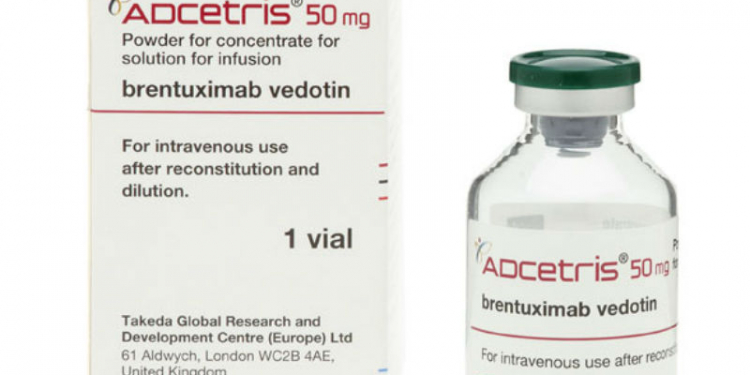The FINANCIAL — Takeda Pharmaceutical Company Limited on November 14 announced that the European Medicines Agency’s (EMA) Committee for Medicinal Products for Human Use (CHMP) has adopted a positive opinion for the extension of the marketing authorization of ADCETRIS (brentuximab vedotin) and recommended its approval for the treatment of adult patients with CD30-positive cutaneous T-cell lymphoma (CTCL) after at least one prior systemic therapy.
ADCETRIS is an antibody-drug conjugate (ADC) directed at CD30 which is expressed on skin lesions in approximately 50 percent of patients with CTCL. ADCETRIS is currently not approved for the treatment of CTCL.
“This opinion represents a crucial first step forward for European patients living with CTCL, a debilitating disease that can have a significant impact on their quality of life,” said Julia Scarisbrick, M.D., Department of Dermatology, University Hospital Birmingham, Birmingham, UK. “The results of the ALCANZA trial demonstrate impressive efficacy along with a manageable safety profile when compared with methotrexate and bexarotene, commonly used therapies. If approved in Europe, ADCETRIS would offer a novel treatment option for CD30-expressing CTCL patients.”
“Today’s positive CHMP opinion is an important milestone for the CTCL community, and further reinforces the role ADCETRIS may have in improving outcomes for patients with CD30-positive malignancies” said Jesus Gomez Navarro, M.D., Vice President, Head of Oncology Clinical Research and Development, Takeda. “For patients with CTCL, there is a significant need for additional treatment options that increase the opportunity to achieve durable responses. We look forward to the European Commission’s review of the CHMP positive opinion of this new indication and the possibility to bring ADCETRIS to appropriate CTCL patients in the European Union.”
The CHMP positive opinion for ADCETRIS will now be reviewed by the European Commission (EC), which has the authority to approve medicines for use in the 28 countries of the European Union (EU), Norway, Liechtenstein and Iceland, according to Takeda.
The positive CHMP opinion is based on the results of the randomized, open-label Phase 3 ALCANZA study designed to evaluate single-agent ADCETRIS versus a control arm of investigator’s choice of standard of care therapies (methotrexate or bexarotene) in patients with CD30-positive CTCL. The trial achieved its primary endpoint and the ADCETRIS treatment arm demonstrated a highly statistically significant improvement in the overall response rate lasting at least four months (ORR4) versus the control arm as assessed by an independent review facility (p-value <0.0001). The ORR4 was 56.3 percent in the ADCETRIS arm compared to 12.5 percent in the control arm. The key secondary endpoints specified in the protocol, including complete response rate, progression-free survival and reduction in the burden of symptoms during treatment, as measured by the Skindex-29 questionnaire1, were all highly statistically significant in favor of the ADCETRIS arm. The safety profile associated with ADCETRIS from the ALCANZA trial was generally consistent with the existing prescribing information. The most common adverse events of any grade include: peripheral neuropathy, nausea, diarrhea, fatigue, vomiting, alopecia, pruritis, pyrexia, decreased appetite and hypertriglyceridemia. In the ADCETRIS arm, the most common grade 3 or 4 events were peripheral sensory neuropathy (no grade 4 events), fatigue, diarrhea, nausea, vomiting and pruritis. In the control arm, the most common grade 3 or 4 events were hypertriglyceridemia, pruritis, fatigue and pyrexia.






























Discussion about this post